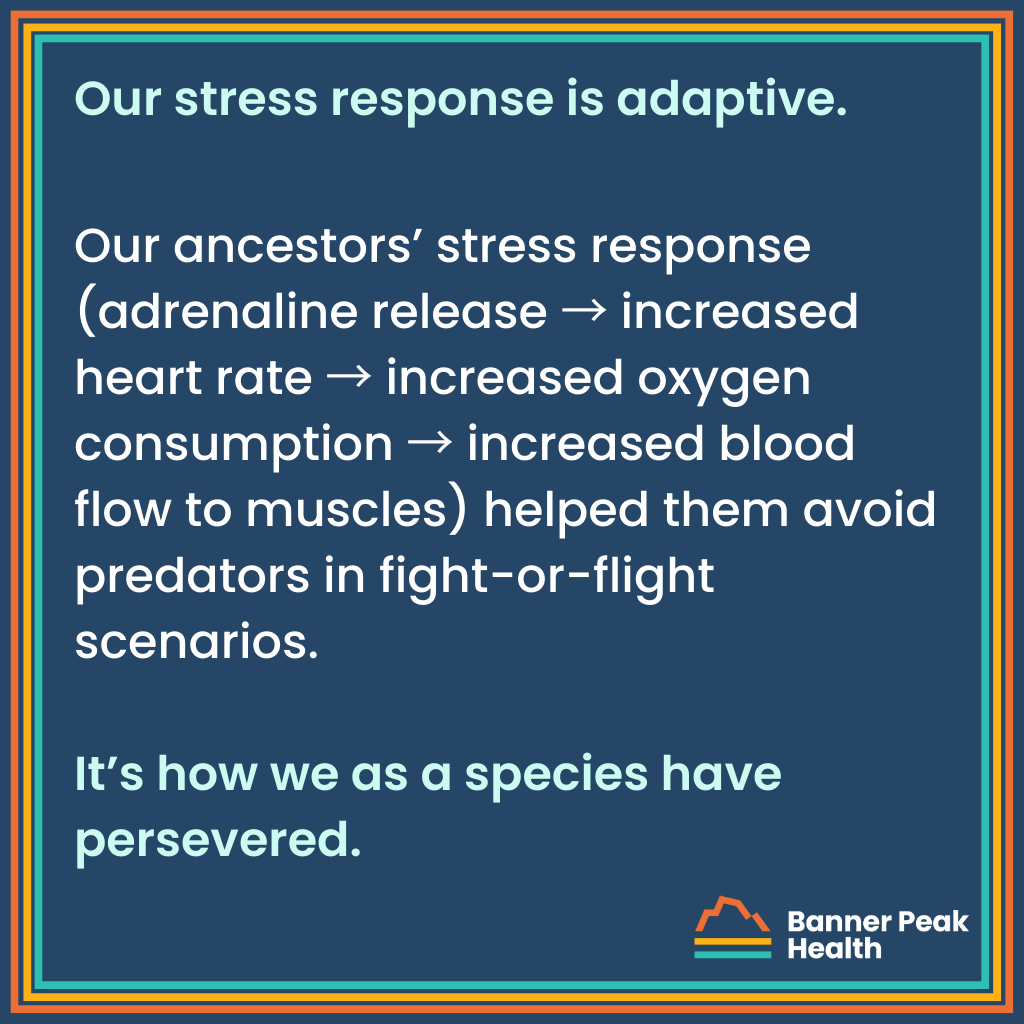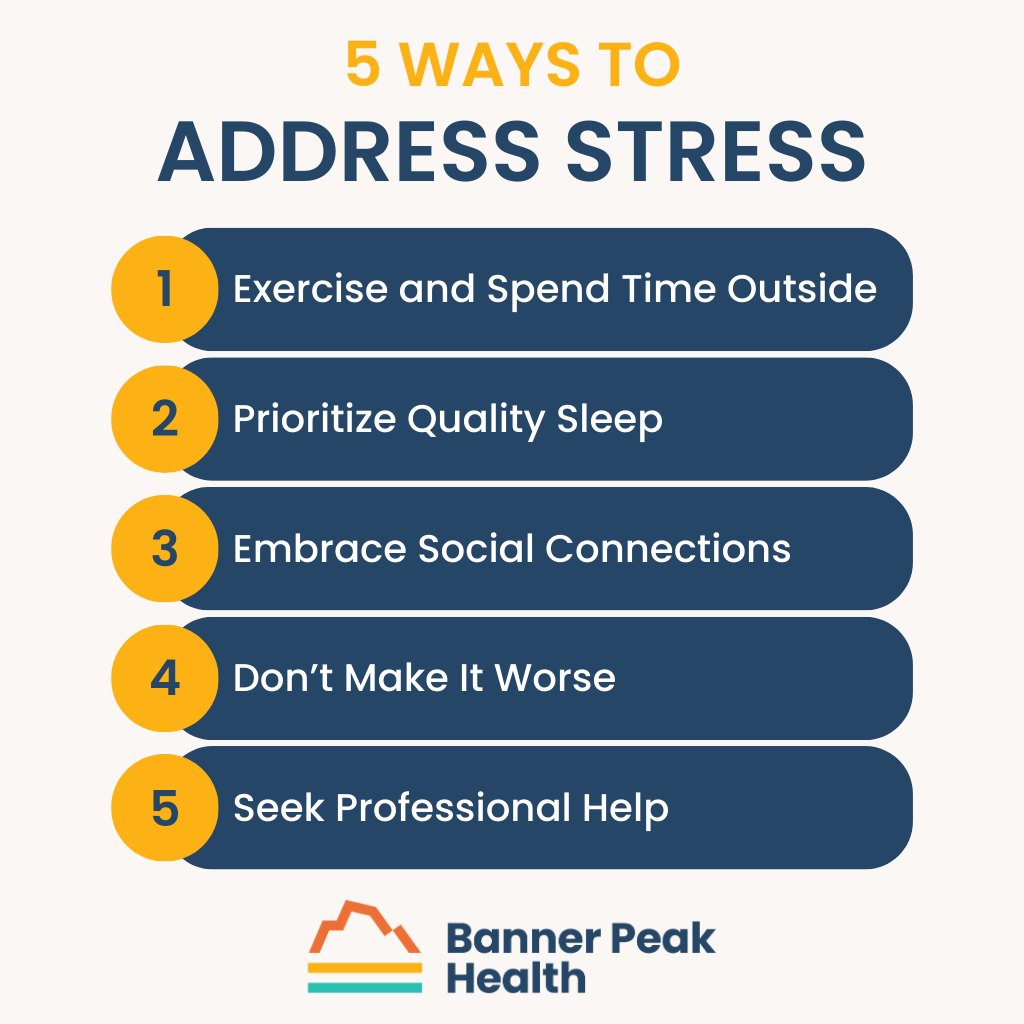Psychology becomes biology. When we think of emotions, we tend to think only of feelings and mental reactions. But as I’ve discussed before, the mind and the body are inextricably linked.
This linkage occurs via hormones, the substances produced by one cell that influence the biology of another. Hormones are how the body’s systems communicate.
For example, the adrenal glands produce adrenaline and cortisol in response to an accelerated heart rate, which can result from both biological stress and emotional stress. The selfsame hormones triggered by injury and lack of oxygen are also triggered by fear, worry, and anger.
Stress Is Here to Stay
Our stress response is adaptive. Our ancestors’ stress response (adrenaline release → increased heart rate → increased oxygen consumption → increased blood flow to muscles) helped them avoid predators in fight-or-flight scenarios. It’s how we as a species have persevered.
In modern society, stress is more chronic. It’s unlikely we’ll need to run from a tiger for a few short minutes (a temporary biological trigger), but we do spend the entire month worrying about paying our mortgage (a long-term emotional trigger).
We live in an epidemic of heart disease, cancer, and obesity. We can connect them all to the constant, dangerous levels of stress we endure daily. Unmanaged, this stress can trigger cascades of biological responses that result in detrimental outcomes.
5 Ways to Address Stress
Unfortunately, external sources of stress — illness or the loss of a loved one, for instance — are often beyond our control. In these cases, we need to understand and address our internal response to stress because it’s our only controllable factor.
Most of us are aware of our stress inbox — the external factors that generate our stress — but haven’t considered our stress outbox — our internal stress response. How do we process and mitigate stress?
Everyone is different, but these tools can be helpful for most people.
Exercise and Spend Time Outside
Exercise is a powerful means of stress reduction. Beyond that, you can also spend time in nature. Regardless of what you’re doing, simply being outside and seeing greenery helps relieve stress.
Prioritize Quality Sleep
We’ve previously discussed sleep and its importance for maintaining good health. Here, we’ll just underscore how poor sleep and chronic stress become a vicious cycle. Stress inhibits sleep, which compounds the stress response, which makes you prone to poor sleep, and so on.
It’s crucial to get sleep no matter what, but we realize this is easier said than done. Ask your doctor for help, and make sure your coping mechanisms don’t hinder quality sleep.
Embrace Social Connections
We humans are social creatures. We’ve survived as a species not just because of our own individual adaptations, but because of what we’ve done collectively.
Don’t ignore that evolutionary tendency. Seek religious and/or secular communities of like-minded people who will support and encourage you. “Going it alone” is not an appropriate stress response and will likely lead to increased stress levels.
Don’t Make It Worse
Avoid substances such as nicotine and alcohol. These potent chemicals make us more prone to stress and work against our ability to manage stress in a healthy way.
Seek Professional Help
You’re not alone in this struggle. Stress is a global epidemic affecting millions of people, and there are amazing therapists, counselors, and coaches available to help.
However, these professionals may have long waiting lists, or may not be available in your immediate area. If you lack the wherewithal to seek or secure professional help, consult your primary care physician.
The Banner Peak Health Difference
Here at Banner Peak Health, we’re thankful our patients see us as more than “just” their physical doctors. That’s certainly not how we see ourselves!
We recognize and appreciate the mind-body connection and regularly help our members with mental health concerns. If you need assistance pursuing a less stressful, more fulfilling life, we’re here to help.

Barry Rotman, MD
For over 30 years in medicine, Dr. Rotman has dedicated himself to excellence. With patients’ health as his top priority, he opened his own concierge medical practice in 2007 to practice medicine in a way that lets him truly serve their best interests.





